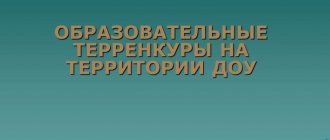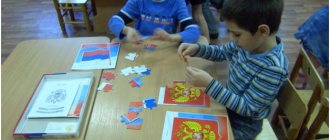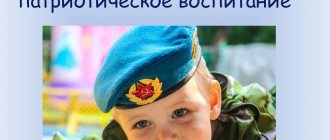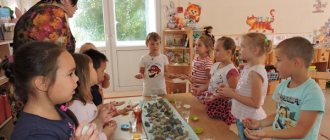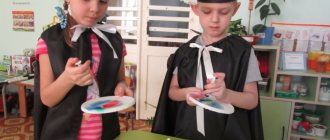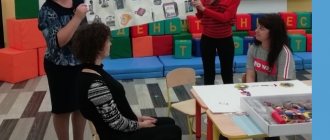From the work experience of a senior preschool teacher. Presentation of work experience
Presentation of work experience in spiritual and moral education in preschool educational institutions
Author: Anufrieva Irina Viktorovna, senior teacher of the MDOU “Kindergarten “Bell”, r.p. Dukhovnitskoye, Saratov region My presentation of work experience in spiritual and moral education in preschool educational institutions will be of interest to senior educators, methodologists, deputy heads of preschool educational institutions, and all those who are involved in organizing educational and methodological work in preschool educational institutions.
I want to start my speech with the words of V.A. Sukhomlinsky “Let the child feel the beauty and admire it, let the images in which the Motherland is embodied be forever preserved in his heart and memory.”
Currently, Russia is going through one of the difficult historical periods. And the greatest danger facing our society today is not the collapse of the economy, not the change of the political system, but the destruction of the individual. Today, material values are exalted over spiritual ones, so children have distorted ideas about kindness, mercy, generosity, justice, citizenship and patriotism. The high level of child crime is caused by a general increase in aggressiveness and cruelty in society. Children are distinguished by emotional, volitional and spiritual immaturity. That is why recently there has been an emphasis on the spiritual and moral education of preschoolers and adolescents. We, the teachers of the Kolokolchik kindergarten, also decided to pay special attention to this. And that is why one of the main goals of our preschool educational institution for the 2014-2015 academic year is: “To promote the formation of spiritual and moral personality traits in children in the process of educational work.” We solve this problem through OD, play activities during RM, and the formation of a developmental environment in groups and in the kindergarten premises. I will share with you the experience of this work on this topic. And I want to start with games, the importance of which in the formation of the spiritual and moral qualities of a preschooler is very great. Play is a natural companion in a child’s life, a source of joyful emotions and has great educational power. Play is the main activity in kindergarten. Therefore, in our work we always turn to the game: both modern and folk. Folk games are an integral part of the spiritual and moral education of preschool children. They reflect the way of life of people, their work, way of life, national foundations, and ideas about honor. Before the game, teachers, as a rule, talk about the culture and life of a particular people. My children and I play Russian folk games: “Who is stronger”, “Dexterous in a circle”, “Stream”, “Tug of war”, The dramatization game “Teremok”, From didactic games we use games with national flavor: “Whose sundress? ", "Decorate clothes with a national pattern", "Sort the patterns." A striking feature of the work to form a spiritual and moral attitude towards cultural heritage is the introduction of children to peasant culture and life, folklore. Peasant art and folklore enter the life of a modern preschool child along with folk songs, nursery rhymes, and lullabies, which is why they are so close and understandable to him. Further, in older groups, children are introduced to oral folk art through fairy tales, aphorisms, proverbs, sayings, folk signs, and heroic epics. This material is given in NOD, in clubs (folklore circle “Kapelka” (folk dances “Quadrille”, “Komarinskaya”). It is great happiness that there is a museum in our village. There the child first understands the concepts of “history”, “traditions”, “ our past." In the museum, children get acquainted with antiques, folk and applied arts, the fishing activities of their ancestors, and the history of the Dukhovnitsky district.
Corners for moral and patriotic education have been organized in all groups. Optimal for spiritual and moral education in kindergarten is to hold seasonal musical and play holidays: “Mother’s Day”; “Defenders of the Fatherland”, “Maslenitsa”; “No one is forgotten and nothing is forgotten”, “Birch trees’ birthday” “Easter”. The children learned the history of the holiday, why eggs are colored, became acquainted with the concepts of “Lent,” and played games that our great-great-grandfathers played on Easter. Introducing the cultural heritage of our country, teachers introduce children to the making of folk toys, crafts and other items, where children acquire skills in working with artistic materials and the habit of doing something with their own hands. This is also the work of the Raduga art studio, painting a Dymkovo toy. We also introduce children to folk costumes. This is very important, as it allows us to show the continuous connection of generations and the connection of the art of costume making with the spiritual traditions of the people. With older preschoolers, costumes are classified according to their affiliation: festive, everyday; for a woman, girl; female Male. There is an acquaintance with the decor of the costume.
Children decorate a women's folk costume, a sundress, a men's blouse (in the drawing, appliqué, this is the choice of pattern).
Our teachers organize targeted walks and excursions along the streets of the village. Targeted observations and a short story from an adult contribute to the fact that the child, without being overloaded with unnecessary information, receives vivid ideas about the object and the history of our village.
And I would also like to talk about one problem. Our attempts to educate the spiritual and moral personality of preschoolers to date show that the weakest point in this activity is the family. Many parents simply do not know that it is in preschool age that social norms, moral requirements and behavioral models are learned through imitation. Therefore, we teachers need to help parents realize that, first of all, moral and spiritual customs and values created by ancestors, great-grandparents and great-grandfathers must be preserved and passed on in the family, and that it is parents who are primarily responsible for raising children. We use very diverse forms of work with parents: *parent meetings on spiritual and moral topics; * lecture hall for parents (club “Interlocutor”) * open screenings of the educational process (“Open Days”) * holding joint exhibitions, competitions, parent seminars on a dialogue basis; *optional classes together with parents: questioning and testing parents in order to identify errors and correct the process of spiritual and moral education in the family; *individual consultations with specialists; *visual types of work: information stands for parents, moving folders, exhibitions of children's works, educational games, literature; *joint holidays with parents, performances, children’s name days; *help from parents to the kindergarten (improving the territory, participating in the preparation of holidays, minor repairs, chores). And in conclusion, I would like to say: Childhood is always turned to the future with hope, no matter how bad the present may be. And children, as a rule, wait for adults to show them the path that will determine the right, worthy life for them. To become kind to people, you need to teach them to understand others, show empathy, be amazed at the beauty of the surrounding nature, treat it with care, and know the history and traditions of their people. Of course, it is difficult to list all the moral qualities of a person in the future society, but the main thing is that these qualities must be developed today. This is our main task, because we are responsible for ensuring that our children have a happy childhood.
Presentation on the topic: Presentation of work experience in spiritual and moral education in preschool educational institutions
We recommend watching:
A lesson on patriotic education in elementary school, dedicated to the anniversary of Irkutsk and the Irkutsk region. Civil-patriotic education of adolescents in the rehabilitation city of Kemerovo. Patriotic corner for the senior group. Development of the educational field “Physical education” in a preschool institution
Similar articles:
Local history work at school
The first steps of education
Little children have no idea about morality until we give it to them. And moral education (so to speak) begins from the cradle itself. The mother gently hugs her baby and smiles, he is pleased. He understands that a smile is good, and begins to smile back at her. She gently strokes the child, kisses him - he understands that gentle touches are pleasant, and touches her in return. These are the first lessons of love and tenderness. The baby learns about what “not good” is later, when he violates the first parental prohibitions. Parents are angry - he understands that he is doing wrong. These moments only seem simple and unimportant ; in fact, this is how the formation of moral qualities begins.
As the child grows up, the child is not just told “no”, but also explained why. The word “impossible” without a logical explanation is perceived by the baby as “possible only when mother is not looking.” Parents explain why you can’t hit, why you can’t scream or offend the kitten, why you need to help the mother. Morality for a child is the difference between good and bad.
Filtering information, or the important role of television
We will not talk now about the dangers of the TV itself (computer, tablet). Doctors talk a lot about this, but we will remind you of the colossal influence that what a small viewer watches has on moral education. Any seemingly most harmless cartoon carries a semantic load . The beloved hero becomes a role model; his behavior makes adjustments to the upbringing of the preschooler. Therefore, pay attention to what your baby is watching?
In the last century, during that same Soviet era, the state solved this problem for parents with the help of Soyuzmultfilm. Everything that appeared on the screens had an educational purpose. Cartoons taught people to be kind, well-mannered, educated, and hardworking. They taught to love their homeland, love their parents, make friends and respect their elders. And even the “evil” in Soviet cartoons, for the most part, was kindly charming and funny. Do we need to remind you what the level of morality was in the country?
Today the filter and censorship were completely turned off . All kinds of monsters, ugly characters, constantly swearing, shoving, rude, ill-mannered and unkempt, look at the baby from the TV screen.
Important
Notice what information is conveyed by low-quality cartoons from cheap commercial channels?
What children see and what they take in:
- Aggression. An eye for an eye, a tooth for a tooth, and that's putting it mildly. Hit, push, throw something at someone who annoys you;
- Selfishness. Every man for himself in this world;
- Lack of compassion. Laugh if someone is hurt, pass by if someone needs help. Plus the endless pain that the heroes experience. They are beaten, a weight falls on them, they fall from a height, and there are no feelings of regret - children are asked to laugh at an animal that has fallen from a height (example);
- Cunning. To deceive, to deceive in order to achieve a goal;
- Bad manners (how I want to talk about Peppa Pig). Cartoon characters are not shy about the sounds of their bodies (and laugh fervently at this), they climb into the mud and enter without knocking.
Fiction for reading in secondary groups - card index
And these characters can become examples of moral culture, just think about it. Cheap videos filled the Internet. Children independently click cartoons on their tablets and computers, while their mothers rush to do household chores. This “information dump” poses a serious danger and damages not only the morality of children, but also their fragile psyche as a whole. Choose only those cartoons that teach goodness and justice - the basis of moral education.

